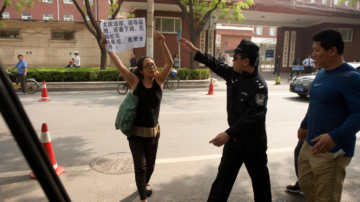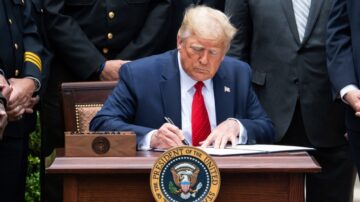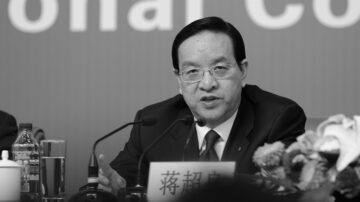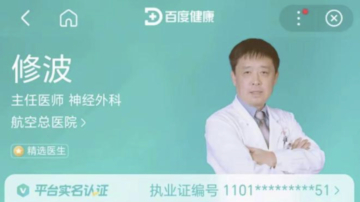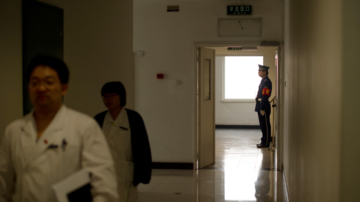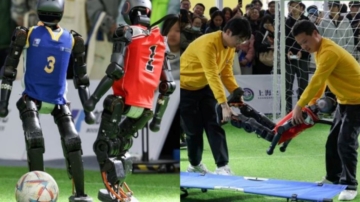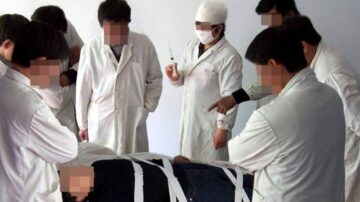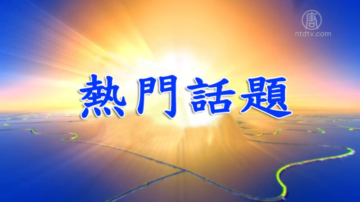【新唐人2013年08月16日讯】近期,大陆媒体报导,在山西襄汾溃坝事故中被撤销党内职务的原临汾市委书记夏振贵,以山西省委统战部副部长的身份出席了一个公开活动,消息一出,立即引发外界关注。因为相较于引咎辞职或免职时的大篇幅报导,夏振贵复出的过程就显得静悄悄的。事实上,中共“污点”官员复出,早已不是甚么新鲜事了,网友讽刺说,他们只是“带薪休假”,回锅当官是迟早的事情。
2008年的山西襄汾溃坝事故,时任临汾市委书记的夏振贵被撤销其党内职务,5年后又回来当山西省委统战部副部长。
对“污点”官员复出甚至陞官,网友质疑,中共所谓的“官员问责制”形同虚设,原来辞职的“污点”官员,回锅当官只是早晚的事情。有网友戏称,这些“污点”官员只是“带薪休假”罢了。
原河北人民广播电台编辑朱欣欣:“现在很多贪官大都是民众揭发出来的,它们(中共)不得不进行处理,但是处理的时候,为了掩人耳目或是临时的处理一下撤个职,过一段时间换另外一个地方,就让他官复原职,或者另任一个甚么职务。”
外界认为,中共的问题官员频频复出,是中共官场“能上不能下”的官僚制度的集中体现。
朱欣欣:“中共现在这一整套的官僚体制,完全变成官僚私有化,而不是公务员的性质了,官员之间都是一个共同利益体。同时,官员基层的政权又和中共中央集权也是一个利益共同体, 一个人出了事情,其他的人因为牵扯到彼此之间的利益和官方一起,他们要竭力的进行保护。”
中央民族大学教授赵士林在微博上表示,官员免职成带薪休假,大量复出极不正常。他举例子说,因三鹿事件被免职的官员,却升任国家食药监局副局长。他认为,中共对官员袒护的行径是极端恶性犯罪,中组部首先要承担责任。
2008年震惊海内外的三鹿毒奶粉丑闻事件,当时引咎辞职的国家质检总局原局长李长江,也回锅政坛,还被委任为“全国扫黄打非工作小组”专职副组长的重要职务。6名三鹿奶粉事件被问责的官员复出或被提拔,除李长江、吴显国,原石家庄市市长冀纯堂已任河北省工信厅副厅长。
对于这些现象,中共国家行政学院教授竹立家指出,现代政治文明体系下,被问责官员的复出一般微乎其微。对西方国家来讲,是很难想像的。
独立评论员张健:“美国的官员,在老百姓的心目中,他是真正的公仆,所以老百姓是用自己的选票来替自己发声,而在中国是完全不一样,一党独裁的原因就是所有党的干部,其实就是党产的一部分,他们所在的位置,不是考虑人民大众做为根本出发点,他们的用意都是维护一党专制。”
美国联邦最高法院出庭律师张军说,在美国,官员引咎辞职后要谋生,可以经商、写书、去大学教书、加入智库,或者做公益事业,但是要想在政治道路上东山再起可谓难上加难。
反观这几年大陆“污点”官员复出政坛的几个步骤,首先,是出了事先免职然后进行冷却,过一段时间后悄然复出,如果有人提出质疑,当局则回应,他们合乎规定,到最后,就不了了之了。
采访/陈汉 编辑/黄亿美 后制/王明宇
Corrupt Officials on Paid Leave in China
Recently, mainland media reported that former Party Secretary
Xia Zhengui, who was removed from his position after
the Shanxi Xiangfen Dam incident, attended a public event
as Shanxi Provincial Deputy Minister of the United Front Department.
This news attracted much attention.
Compared to an extensive coverage of his removal,
his return was rather quiet.
In fact, the comeback of a corrupt official of the Chinese
Communist Party (CCP) is nothing new.
Some netizens said, ironically, they were merely
on "paid leave," and their returning is only a matter of time.
In 2008, Xia was removed from his post as party secretary.
Five years later, he is back as the deputy minister of Shanxi
Provincial Party United Front Ministry.
Regarding 'tainted' officials being promoted, netizens
question the existence of an "accountability system."
Some netizens jokingly said that these corrupt officials
were not being punished, but were on paid leave.
Zhu Xinxin, former radio editor: "Many corrupt officials were
exposed by ordinary citizens, and the CCP had no choice but to deal with them.
By temporarily removing them from their positions,
the CCP deceives the public.
After a short period, they will return to work at a different
location and in a different job.
Outsiders believe that moving up, not down,
is the collective manifestation of the CCP's officialdom."
Zhu Xinxin: "Now this CCP bureaucracy has completely
privatized the officialdom, they are no longer public servants.
Officials share a common interest among themselves,
and grassroots officials share a common interest with the Chinese Communist regime.
When one official falls, the interests of others
will be affected.
Therefore, they are trying their best to protect each other."
Professor Zhao Shilin at National University said on his blog:
It is not normal for most officials to come back after
their removal.
For example, the dismissed official due to the Sanlu
(the company that produced the tainted baby formula)
incident was promoted to deputy director of the State Food
and Drug Administration.
It is a vicious crime for the CCP to shelter them.
In 2008, the Sanlu milk scandal shocked
the whole world.
Li Changjiang, former director of AQSIQ (Administration
of Quality Supervision, Inspection and Quarantine) was dismissed.
Li Changjiang was re-appointed as deputy director
of the national anti-pornography group, an important job.
Six other officials involved in the Sanlu incident
have all returned to work or have been promoted.
Professor Zhu Lijia from the National School of Administration
said under a modern civilized political system, the comeback
of corrupt officials is minimal because they are held
accountable.
It is very difficult for Western countries to picture
these phenomena.
Independent commentator Zhang Jian: "In the US,
officials are public servants, and people will use their votes
to voice their opinions.
In China, it is totally different.
A one-party dictatorship means all party cadres
are a part of the party.
Their fundamental starting point is not the masses,
but how to maintain the one-party dictatorship."
The Federal Supreme Court lawyer Zhang Jun said that
in the US, after officials resigned, they can start businesses,
write books, teach in universities, join think tanks,
and do public service.
However, it is extremely hard for them
to make a political comeback.
By contrast, in Mainland China, officials are dismissed first,
and after a cooling period, they quietly return.
If someone questions the authorities, they would respond
that these officials meet the requirement.
In the end, the entire matter is dropped.
2008年的山西襄汾溃坝事故,时任临汾市委书记的夏振贵被撤销其党内职务,5年后又回来当山西省委统战部副部长。
对“污点”官员复出甚至陞官,网友质疑,中共所谓的“官员问责制”形同虚设,原来辞职的“污点”官员,回锅当官只是早晚的事情。有网友戏称,这些“污点”官员只是“带薪休假”罢了。
原河北人民广播电台编辑朱欣欣:“现在很多贪官大都是民众揭发出来的,它们(中共)不得不进行处理,但是处理的时候,为了掩人耳目或是临时的处理一下撤个职,过一段时间换另外一个地方,就让他官复原职,或者另任一个甚么职务。”
外界认为,中共的问题官员频频复出,是中共官场“能上不能下”的官僚制度的集中体现。
朱欣欣:“中共现在这一整套的官僚体制,完全变成官僚私有化,而不是公务员的性质了,官员之间都是一个共同利益体。同时,官员基层的政权又和中共中央集权也是一个利益共同体, 一个人出了事情,其他的人因为牵扯到彼此之间的利益和官方一起,他们要竭力的进行保护。”
中央民族大学教授赵士林在微博上表示,官员免职成带薪休假,大量复出极不正常。他举例子说,因三鹿事件被免职的官员,却升任国家食药监局副局长。他认为,中共对官员袒护的行径是极端恶性犯罪,中组部首先要承担责任。
2008年震惊海内外的三鹿毒奶粉丑闻事件,当时引咎辞职的国家质检总局原局长李长江,也回锅政坛,还被委任为“全国扫黄打非工作小组”专职副组长的重要职务。6名三鹿奶粉事件被问责的官员复出或被提拔,除李长江、吴显国,原石家庄市市长冀纯堂已任河北省工信厅副厅长。
对于这些现象,中共国家行政学院教授竹立家指出,现代政治文明体系下,被问责官员的复出一般微乎其微。对西方国家来讲,是很难想像的。
独立评论员张健:“美国的官员,在老百姓的心目中,他是真正的公仆,所以老百姓是用自己的选票来替自己发声,而在中国是完全不一样,一党独裁的原因就是所有党的干部,其实就是党产的一部分,他们所在的位置,不是考虑人民大众做为根本出发点,他们的用意都是维护一党专制。”
美国联邦最高法院出庭律师张军说,在美国,官员引咎辞职后要谋生,可以经商、写书、去大学教书、加入智库,或者做公益事业,但是要想在政治道路上东山再起可谓难上加难。
反观这几年大陆“污点”官员复出政坛的几个步骤,首先,是出了事先免职然后进行冷却,过一段时间后悄然复出,如果有人提出质疑,当局则回应,他们合乎规定,到最后,就不了了之了。
采访/陈汉 编辑/黄亿美 后制/王明宇
Corrupt Officials on Paid Leave in China
Recently, mainland media reported that former Party Secretary
Xia Zhengui, who was removed from his position after
the Shanxi Xiangfen Dam incident, attended a public event
as Shanxi Provincial Deputy Minister of the United Front Department.
This news attracted much attention.
Compared to an extensive coverage of his removal,
his return was rather quiet.
In fact, the comeback of a corrupt official of the Chinese
Communist Party (CCP) is nothing new.
Some netizens said, ironically, they were merely
on "paid leave," and their returning is only a matter of time.
In 2008, Xia was removed from his post as party secretary.
Five years later, he is back as the deputy minister of Shanxi
Provincial Party United Front Ministry.
Regarding 'tainted' officials being promoted, netizens
question the existence of an "accountability system."
Some netizens jokingly said that these corrupt officials
were not being punished, but were on paid leave.
Zhu Xinxin, former radio editor: "Many corrupt officials were
exposed by ordinary citizens, and the CCP had no choice but to deal with them.
By temporarily removing them from their positions,
the CCP deceives the public.
After a short period, they will return to work at a different
location and in a different job.
Outsiders believe that moving up, not down,
is the collective manifestation of the CCP's officialdom."
Zhu Xinxin: "Now this CCP bureaucracy has completely
privatized the officialdom, they are no longer public servants.
Officials share a common interest among themselves,
and grassroots officials share a common interest with the Chinese Communist regime.
When one official falls, the interests of others
will be affected.
Therefore, they are trying their best to protect each other."
Professor Zhao Shilin at National University said on his blog:
It is not normal for most officials to come back after
their removal.
For example, the dismissed official due to the Sanlu
(the company that produced the tainted baby formula)
incident was promoted to deputy director of the State Food
and Drug Administration.
It is a vicious crime for the CCP to shelter them.
In 2008, the Sanlu milk scandal shocked
the whole world.
Li Changjiang, former director of AQSIQ (Administration
of Quality Supervision, Inspection and Quarantine) was dismissed.
Li Changjiang was re-appointed as deputy director
of the national anti-pornography group, an important job.
Six other officials involved in the Sanlu incident
have all returned to work or have been promoted.
Professor Zhu Lijia from the National School of Administration
said under a modern civilized political system, the comeback
of corrupt officials is minimal because they are held
accountable.
It is very difficult for Western countries to picture
these phenomena.
Independent commentator Zhang Jian: "In the US,
officials are public servants, and people will use their votes
to voice their opinions.
In China, it is totally different.
A one-party dictatorship means all party cadres
are a part of the party.
Their fundamental starting point is not the masses,
but how to maintain the one-party dictatorship."
The Federal Supreme Court lawyer Zhang Jun said that
in the US, after officials resigned, they can start businesses,
write books, teach in universities, join think tanks,
and do public service.
However, it is extremely hard for them
to make a political comeback.
By contrast, in Mainland China, officials are dismissed first,
and after a cooling period, they quietly return.
If someone questions the authorities, they would respond
that these officials meet the requirement.
In the end, the entire matter is dropped.

